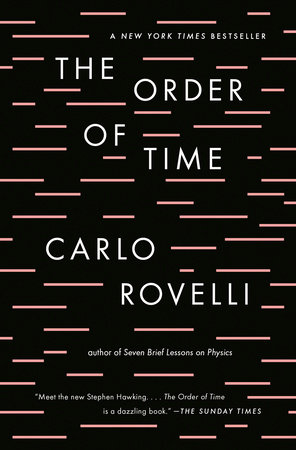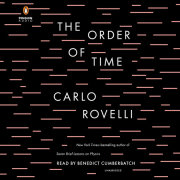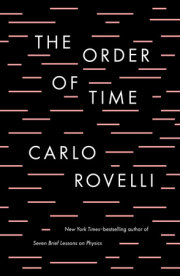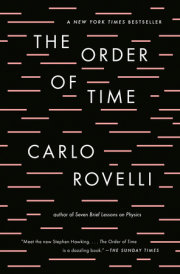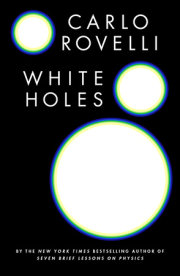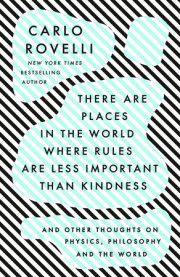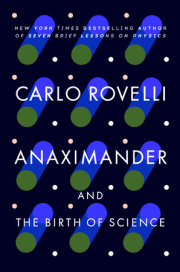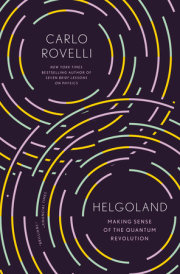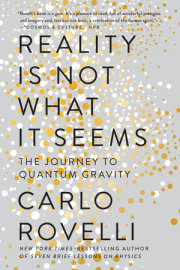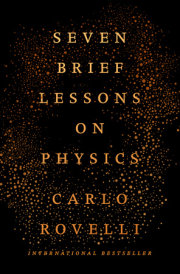Introduction: Perhaps Time is the Greatest MysteryI stop and do nothing. Nothing Happens. I am thinking about nothing. I listen to the passing of time.
This is time, familiar and intimate. We are taken by it. The rush of seconds, hours, years that hurls us toward life then drags us toward nothingness.... We inhabit time as fish live in water. Our being is being in time. Its solemn music nurtures us, opens the world to us, troubles us, frightens and lulls us. The universe unfolds into the future, dragged by time, and exists according to the order of time.
In Hindu mythology, the river of the cosmos is portrayed with the sacred image of Shiva dancing: his dance supports the coursing of the universe; it is itself the f lowing of time. What could be more universal and obvious than this
flowing?
And yet things are somewhat more complicated than this. Reality is often very different from what it seems. The Earth appears to be flat but is in fact spherical. The sun seems to revolve in the sky when it is really we who are spinning. Neither is the structure of time what it seems to be: it is different from this uniform, universal flowing. I discovered this, to my utter astonishment, in the physics books I read as a university student: time works quite differently from the way it seems to.
In those same books I also discovered that we still don’t know how time actually works. The nature of time is perhaps the greatest remaining mystery. Curious threads connect it to those other great open mysteries: the nature of mind, the origin of the universe, the fate of black holes, the very functioning of life on Earth. Something essential continues to draw us back to the nature of time.
Wonder is the source of our desire for knowledge, and the discovery that time is not what we thought it was opens up a thousand questions. The nature of time has been at the center of my life’s work in theoretical physics. In the following pages, I give an account of what we have understood about time and the paths that are being followed in our search to understand it better, as well as an account of what we have yet to understand and what it seems to me that we are just beginning to glimpse.
Why do we remember the past and not the future? Do we exist in time, or does time exist in us? What does it really mean to say that time “passes”? What ties time to our nature as persons, to our subjectivity?
What am I listening to when I listen to the passing of time?
This book is divided into three unequal parts. In the first, I summarize what modern physics has understood about time. It is like holding a snowflake in your hands: gradually, as you study it, it melts between your fingers and vanishes. We conventionally think of time as something simple and fundamental that f lows uniformly, independently from everything else, from the past to the future, measured by clocks and watches. In the course of time, the events of the universe succeed each other in an orderly way: pasts, presents, futures. The past is fixed, the future open. . . . And yet all of this has turned out to be false.
One after another, the characteristic features of time have proved to be approximations, mistakes determined by our perspective, just like the flatness of the Earth or the revolving of the sun. The growth of our knowledge has led to a slow disintegration of our notion of time. What we call “time” is a complex collection of structures, of layers. Under increasing scrutiny, in ever greater depth, time has lost layers one after another, piece by piece. The first part of this book gives an account of this crumbling of time.
The second part describes what we have been left with: an empty, windswept landscape almost devoid of all trace of temporality. A strange, alien world that is nevertheless still the one to which we belong. It is like arriving in the high mountains, where there is nothing but snow, rocks, and sky. Or like it must have been for Armstrong and Aldrin when venturing onto the motionless sand of the moon. A world stripped to its essence, glittering with an arid and troubling beauty. The physics on which I work—quantum gravity—is an attempt to understand and lend coherent meaning to this extreme and beautiful landscape. To the world without time.
The third part of the book is the most difficult, but also the most vital and the one that most closely involves us. In a world without time, there must still be something that gives rise to the time that we are accustomed to, with its order, with its past that is different from the future, with its smooth f lowing. Somehow, our time must emerge around us, at least
for us and at our scale.
This is the return journey, back toward the time lost in the first part of the book when pursuing the elementary grammar of the world. As in a crime novel, we are now going in search of a guilty party: the culprit who has created time. One by one, we discover the constituent parts of the time that is familiar to us—not, now, as elementary structures of reality, but rather as useful approximations for the clumsy and bungling mortal creatures we are: aspects of our perspective, and aspects, too, perhaps, that are decisive in determining what we are. Because the mystery of time is ultimately, perhaps, more about ourselves than about the cosmos. Perhaps, as in the first and greatest of all detective novels, Sophocles’
Oedipus Rex, the culprit turns out to be the detective.
Here, the book becomes a fiery magma of ideas, sometimes illuminating, sometimes confusing. If you decide to follow me, I will take you to where I believe our knowledge of time has reached: up to the brink of that vast nocturnal and star-studded ocean of all that we still don’t know.
Copyright © 2018 by Carlo Rovelli. All rights reserved. No part of this excerpt may be reproduced or reprinted without permission in writing from the publisher.

